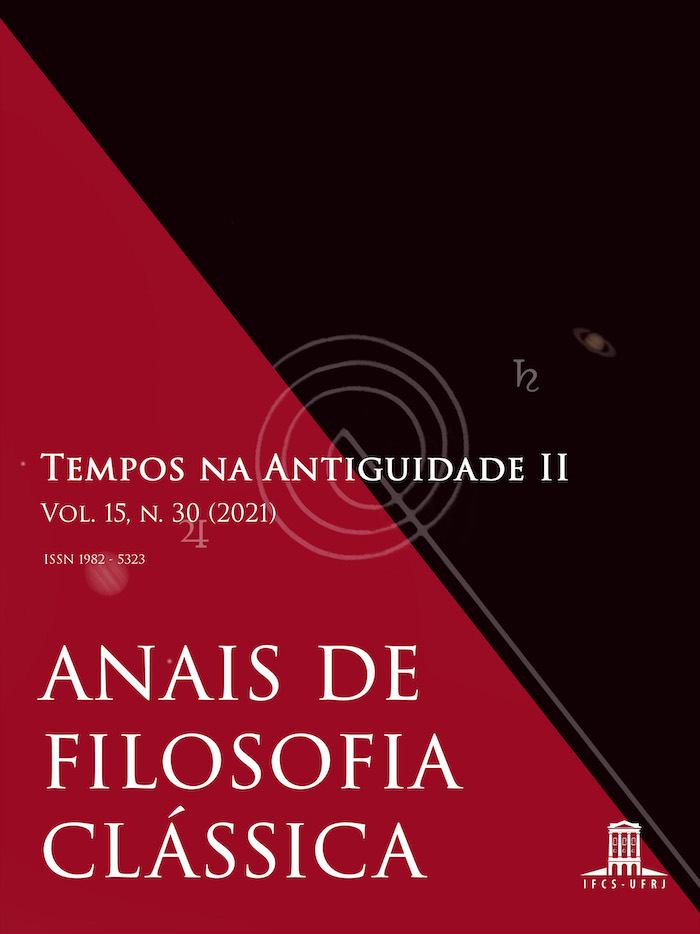The Gyges' Ring in Plato's Republic
DOI:
https://doi.org/10.47661/afcl.v15i30.46288Keywords:
Plato’s Republic, Gyges’ Ring, Glaucon’s Challenge, Lyric PoetryAbstract
Gyges narrative appears in Plato’s Republic (359b-360b), where Glaucon tells how Gyges become the ruler of Lydia in Asia Minor (Anatolia). Glaucon’s Challenge is the base to all further exposure of justice in Plato’s Republic. It will be through this Challenge that Glaucon will tell Socrates how to present justice proving it in all ways better than injustice. However, in passage 359d we have a difficulty to the direct identification of Gyges. Through this study we aim to present some proposals for the passage, using for this the lyrical and historical sources for a completed analysis of the Gyges’ passage. At the end of the article, we proposal an interpretation of the passage to solve the manuscript problem.References
Plato’s Republic
ADAM, James. The Republic of Plato. Ed. J. Adam. Cambridge: Cambridge University Press, 1979.(2v)
AST, Friedrich. Platonis quae exstant Opera. Tomus IV, Politiae Lib. I-VIII. Lipsiae: Libraria Weidmannia, 1822.
BURNET, John. Platonis Opera, recognovit brevique adnotatione criticainstrvxit: Ioannes Burnet, Tomvs IV. Oxford: Oxford University Press, 1902.
JOWETT, Benjamin.; CAMPBELL, Lewis. Plato’s Republic. The Greek Text, v. III: Notes. Oxford: The Clarendon Press, 1894.
SCHNEIDER, Carl Ernst Christoph. Platonis Opera Graece., v. I. Lipsiae, 1830.
SLINGS, Simon Roelof. Platonis Rempvblicam, recognovit brevique adnotatione criticainstrvxit: S. R. Slings. Oxford: Oxford University Press, 2003.
STALLBAUM, Johann Gottfried. Platonis Dialogos Selectos, v. III.1. Politiae I-V. Gothae et Erfordiae, 1829.
Greek Lyric
ADRADOS, Francisco Rodriguez. Líricos Griegos: Elegiacos y Yambógrafos Arcaicos. Texto traduzido por F. R. Adrados. Madrid: Consejo Superior de Investigaciones Científicas, 1990.
BERGK, Theodor. Poetae Lyrici, v.2. Poetas elegiacos et Iambographos Continens. Lipsiae: Aedibus B. G. Teubneri, 1882.
GERBER, Douglas. Greek Iambic Poetry. Edited and translated by D. Gerber. Cambridge; Massachusetts; London: Harvard University Press, 1999.
GERBER, Douglas. Greek Elegiac Poetry. Edited and translated by D. Gerber. Cambridge; Massachusetts; London: Harvard University Press, 1999.
WEST, Martin Litchfield. Iambi et Elegi Graeci. Ante Alexandrum Cantati. (Editio Altera). Edidit M. L. West. Oxford: Oxford University Press, 1971.
WEST, Martin Litchfield. Carmina Anacreontea. Edidit M. L. West. Stutgardiae; Lipsiae: Teubner, 1993.
Herodotus
HUDE, Carolus. Herodoti Historiae, Tomvs I. recognovit brevique adnotatione criticainstrvxit: Carolvs Hude. Oxford: Oxford University Press, 1927.
Stein, Heinrich. Herodotos. vol. I.Berlim: Weidmannsche Buchhandlung, 1883.
Greek Classics
CAMPBELL, David A. Greek Lyric. with English translated by D. A. Campbell. Cambridge, Mass.: Harvard University Press; London: W. Heinemann, 1982-1993. (5v)
FRAZER, Sir James George. Pausanias’s Description of Greece: Commentary on Books II-V: Corinth, Laconia, Messenia, Elis. London: Macmillan and co., limited, 1913.
Hesychii Alexandrini. Lexicon. Post Ioannem Albertum recensuit Mauricius Schmidt. Volumen Primum. Ienae: Sumptibus Frederici Maukii, 1858.
JONES, Horace Leonard. Strabo Geography. Books 13-14. Edição de H. L. Jones. Cambridge, Mass.: Harvard University Press; London: William Heinemann, 1924.
KROLL, Guilhermus. Procli Diadochi in Platonis Rem Publicam Comentarii, v. II. Edidit G. Kroll. Lipsiae: Aedibvs B. G. Tevbneri, 1901.
LEUTSCH, Ernestus Ludov; Schneidewin, Fredericus Guilhermus. Paroemiographi Graeci. Edição de Leutsch & Schneidewin, 2.v, Gottingae: Sumptus Fecit Libraria Dieterichiana, 1939-51.
MÜLLER, Karl. Fragmenta Historicum Graecorum, vol. III. Paris: Editore Ambrosio Firmin Didot, 1849.
PATON, William Roger. The Greek Anthology, v. 2 and 4. Whith English translated by W. R. Paton. London: William Heinemann; New York: G. P. Putnam’s Sons, 1918-9.
ROSS, William. David. Aristotelis Ars Rhetorica. Edição de W. D. Ross. Oxford: Clarendon Press, 1959.
STURZIUS, Fredericus Guilhermus. Etymologicum Graecae Lynguae Gudianum. Qvas digessit et vna CVM svis edidit F. G. Stvrtzivs. Lipsiae, 1818.
Suidae Lexicon Graeci et Latine. Typis Academicis, 1705. (3v.)
SYLBURGIUS, Fredericus. Etymologicon Magnum. Opera Friderici Sylbvrgi iveterani. Lipsiae, 1816.
Latin Classics
MILLER, Walter. Cicero de Officiis. With English translation by W. Miller. London: William Heinemann; New York: G. P. Putnam’s Sons, 1928.
Studies
BURNET, John. “Platonica II”. The Classical Review. v. 19, n. 2 (1905): 100.
DANZIG, Gabriel. Rhetoric and the Ring: Herodotus and Plato on the Story of Gyges as a Politically Expedient Tale. Greece & Rome, v. 55, n. 2 (2008): 169-192.
FAUTH, Wolfgang. Zum Motivbestand der Platonischen Gyges legende. Rheinisches Museum für Philologie, v.113 (1970): 1-42.
GELZER, Heinrich. Das Zeitalter des Gyges. Rheinisches Museum für Philologie, v. 30 (1875):230-268.
GERBER, Douglas. A Companion to the Greek Lyric Poets. Leiden; New York; Köln: Brill, 1997.
HANFMANN, George Maxim Anossov. Lydiaka. Harvard Studies in Classical Philology, v. 63(1948): 65-88.
JACOBY, Felix. The Date of Archilochos. Classical Quarterly, v. 35, n.3(1941): 97-109.
JONES, William. Finger-Ring Lore. London: Chatto and Windus, Piccadilly, 1877.
KIRWAN, Christopher. Glaucon’s Challenge. Phronesis, v. 10, n. 2 (1965): 162-173.
LAIRD, Andrew. Ringing the Changes on Gyges: Philosophy and the Formation of Fiction in Plato’s Republic. Journal of Hellenic Studies, v. 121(2001): 12-29.
PEDLEY, John Griffiths. Ancient Literary Sources on Sardis. Harvard University Press, 1972.
SLINGS, Simon Roelof. Critical Notes on Plato’s Politeia II. Mnemosyne, v. 17, fasc. 3-4 (1989): 381-383.
SMITH, Kirby Flower. The Tale of Gyges and the King of Lydia. The American Journal of Philology, v. 23, n. 3 (1902): 261-282.
SMITH, Kirby Flower. The Tale of Gyges and the King of Lydia. The American Journal of Philology, v. 23, n. 4 (1902): 361-387.
SPALINGER, Anthony. The Date of the Death of Gyges and its Historical Implications. Journal of the American Oriental Society, v. 98, n. 4 (1978): 400-409.
URE, Percy Neville. The Origin of Tyranny. Cambridge: Cambridge University Press,1922.
WEST, Martin Litchfield. Greek Lyric Poetry. Oxford; New York: Oxford University Press, 1993.
WEST, Martin Litchfield. Studies in Greek Elegy and Iambus. Berlin: Walter de Gruyter, 1974.
Thesaurus Linguae Graecae (TLG)
Anônimo. In Aristotelis artem rhetoricam commentarium.
Anônimo. Violarium da Eudocia.
Anthologiae Graecae.
LIBANIUS. Epistulae.
LIBANIUS. Orationes.
LUCIANO. Bis accusatussivetribunalia.
LUCIANO. Navigium.
NAZIANZENUS, Gregorius. Contra Julianum imperatorem.
NAZIANZENUS, Gregorius. Funebris oratio in laudem Basilii Magni Caesareae in Cappadocia episcope.
NAZIANZENUS, Gregorius. Carmina moralia.
NAZIANZENUS, Gregorius. Carmina de se ipso.
PHILOSTRATUS. Vita Apollonii.
PHILOSTRATUS. Heroicus.
SocraticorumEpistulae.
STOBAEUS, Joannes. Anthologium.
Suidae Lexicon.
THEON. Rhet. Graeci.
TZETZES. Chiliades.
________. Invect.


